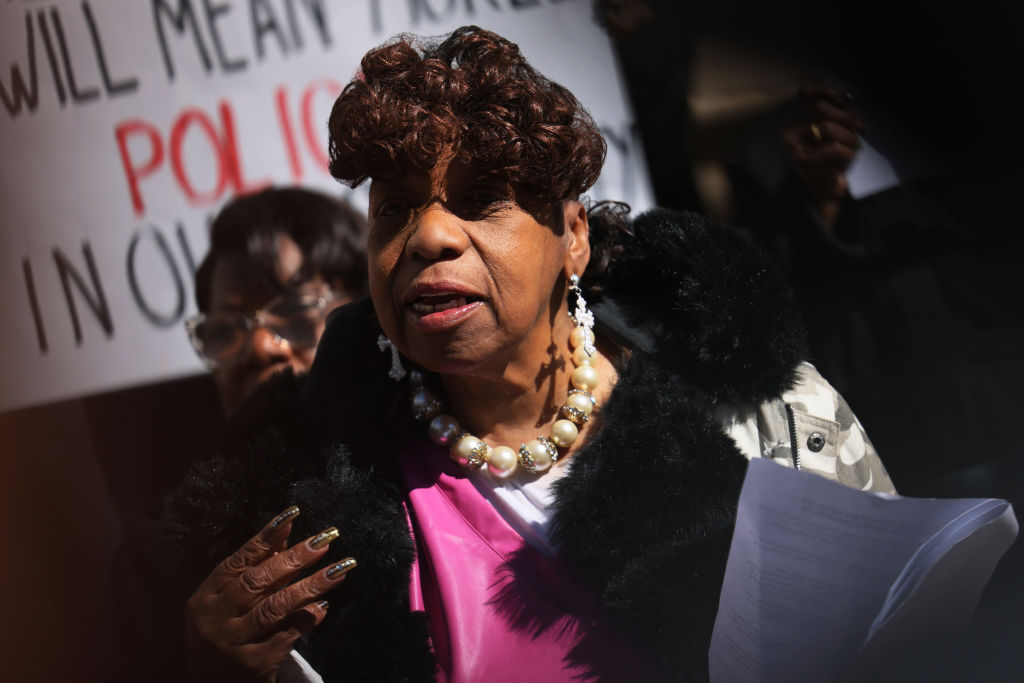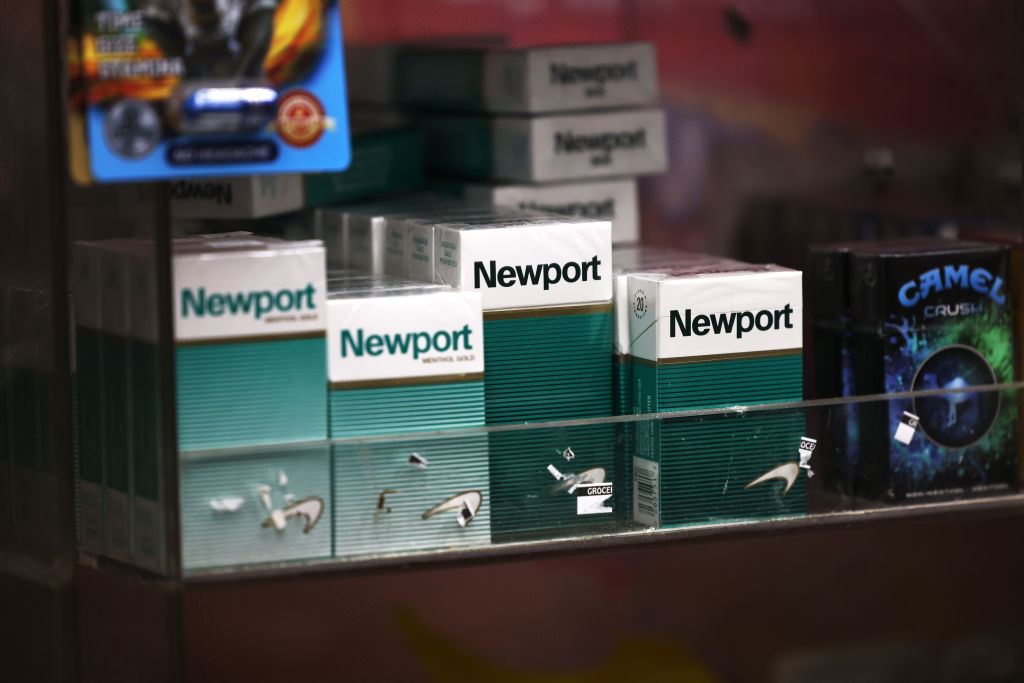Menthol Ban: Gwen Carr Warns Policing, Racial Consequences
Eric Garner’s Mother Says Banning Menthol Cigarettes Will Have Policing, Racial Consequences

Gwen Carr speaks during a rally on the steps of City Hall on March 9, 2023, in New York City. | Source: Michael M. Santiago / Getty
The mother of Eric Garner was among a group of Black leaders, activists and advocates who came together on Monday to not only condemn the plan to ban menthol cigarettes but also to sound the alarm on the likely “policing” and racial consequences of instituting such a ban.
Gwen Carr, whose son was choked to death by a gang of NYPD officers who accused him of selling loose, untaxed cigarettes in public in 2014, spoke Monday during a panel discussion about the Food and Drug Administration’s (FDA) targeting of menthol cigarettes in its stated effort to reduce tobacco-related disease and death.
But banning menthol cigarettes doesn’t begin to address the likely legal domino effect that prohibiting those products will spark, Carr warned.
“Even though the medical profession says that it’s not going to be a policing issue, they’ll [Law Enforcement] be the ones imposing the consequences [of a menthol ban],” Carr said during the panel discussion. “This [ban] is not the answer. We have to do other things; we have to educate, counsel, treat. Stop the ban—it’s not the answer.”
Carr also said: “Menthol has not killed anyone, it’s nicotine. If you’re going to ban smoking, don’t make it a racist thing. Ban it all or ban none.”
Statistics show that menthol cigarettes and other flavored tobacco products are preferred by Black smokers. That racial factor was absent from the FDA’s announcement last year that it intended to ban menthol tobacco products.
“The proposed rules would help prevent children from becoming the next generation of smokers and help adult smokers quit,” Health and Human Services Secretary Xavier Becerra said in a statement. “Additionally, the proposed rules represent an important step to advance health equity by significantly reducing tobacco-related health disparities.”
The FDA is part of the Department of Health and Human Services.
The NAACP has said the menthol ban is long overdue.
“For decades, the tobacco industry has been targeting African Americans and have contributed to the skyrocketing rates of heart disease, stroke and cancer across our community,” the NAACP said in a statement following the FDA’s announcement last year. “The tobacco industry is on a narrow quest for profit, and they have been killing us along the way. The NAACP has been calling for a ban on menthol cigarettes and flavored e-cigarettes for years now, and we applaud the FDA’s latest plan to do just that. It’s about time we prioritize the health and well-being of African Americans.”

Newport is a popular brand of menthol cigarettes. | Source: Michael M. Santiago / Getty
The proposed rule going into effect will not stop the sale of so-called regular cigarettes that are not menthol-flavored and can still cause adverse health reactions to their presumably non-Black smokers, making the menthol ban even more curious to those who oppose it.
According to statistics from the Centers for Disease Control and Prevention (CDC), nearly 77% of Black smokers prefer menthol cigarettes. That’s because, the CDC says, “the tobacco industry has aggressively marketed menthol products to young people and African Americans, especially in urban communities.”
Further, Black people die from diseases related to tobacco use at a higher rate than whites even though Blacks smoke fewer cigarettes and start smoking at an older age than white people do, according to the CDC.
Another argument in favor of the ban is that menthol cigarettes are more addictive than regular ones, in part because the menthol flavor makes “smoke inhalation easier to tolerate and therefore promote nicotine addiction and smoking-related illness,” scientists at Yale concluded in a 2012 study. That research also determined that menthol cigarettes posed the worst risk to children, who not only find them easier to smoke because of the flavor but are also more frequently exposed to them at a younger age.
One study even found that menthol cigarettes were marketed to African American youth in a “predatory” manner through ads and lower prices near many California high schools. Another study released in the American Journal of Public Health showed that banning menthol cigarettes could save as much as 600,000 premature deaths by the year 2050.
Thus, health experts at Washington University in St. Louis concluded that the menthol ban would benefit young Black people the most.
FDA officials have said they expect the menthol ban to lead to nearly 1 million smokers quitting altogether, including about 230,000 who are Black.
To be sure, though, just because something is less addictive doesn’t mean it’s not addictive. In fact, a ban on menthol cigarettes will not eliminate the accessibility of regular cigarettes regardless of the smoker’s age. It also won’t eliminate the presence of menthol cigarettes, if past American prohibitions are any indications.
Critics of the ban have said there are several additional considerations that have not been adequately addressed.
The Washington Post’s Eugene Robinson wrote in a column that the menthol ban left a bad taste in his mouth in part because it would only create a black market; one that, by introducing a criminal element to smoking menthol cigarettes, would likely disproportionately affect the same Black people the ban is supposed to be helping.
The FDA stresses on Thursday that there menthol cigarettes and flavored cigars would not be illegal by definition.
“Importantly, the FDA cannot and will not enforce against individual consumers for possession or use of menthol cigarettes or flavored cigars. If these proposed rules are finalized and implemented, FDA enforcement will only address manufacturers, distributors, wholesalers, importers and retailers who manufacture, distribute, or sell such products within the U.S. that are not in compliance with applicable requirements,” the FDA press release said. “These proposed regulations do not include a prohibition on individual consumer possession or use.”
“Given all the ways that Americans of all races manage to obtain illicit mood-altering substances of all kinds, we should anticipate the emergence of an underground market in menthol cigarettes,” Robinson wrote at the time.
Meanwhile, sales for menthol cigarettes have remained at a consistent level while sales of regular cigarettes have dipped slightly, according to the most recent statistics available. The cigarette business is nearly a trillion-dollar industry with an expected growth rate of 1.8% from now through 2028.
SEE ALSO:
Documentary Shames Tobacco Industry For Targeting The Black Community
One Of The Country’s Most Segregated Cities Has Easier Access To Tobacco Than Healthy Food



















